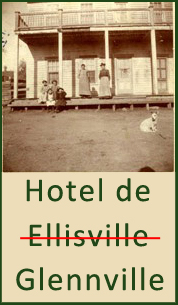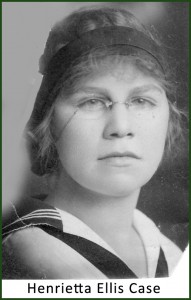By Casey Gauntt
We are never completely free of the instruments that fashioned us.
–Henrietta Ellis Case (1952).
Henrietta Ellis Case is my maternal grandmother and was born December 28, 1897 in Glennville, a small farming town about thirty miles northeast of Bakersfield, California, and nestled in the foothills of the Greenhorn Mountains on the west slope of the Sierra Nevada mountain range. She was a prolific writer and poet and once wrote “We are never completely free of the instruments that fashioned us and this holds true for me with the wild Ellis strain mixed with the prosaic Slinkard blood.” Here’s the story of how Henrietta was almost born in “Ellisville.”
Henrietta’s father, Alfred (Alf) Ellis, was born in Texas and the youngest of eight children of Radford (Rad) Ellis and Celia Ann Jones, both from Wilkinson, Missouri. In the 1850s Rad brought the family to Linn’s Valley that, much to the chagrin of the Ellis family, would become the town of Glennville. Rad was a prominent cattleman in the Valley.
Alf was a troubled soul and something of a character, much of which can likely be traced back to the death of his father and the story of how the town got its name.
In the early 1860s Andy McFarlane and some partners decided to build a new wagon wheel road to replace the old Bull Road that connected Visalia with the mining town of Kernville high up in the western Sierra Nevada mountains near Lake Isabella.
McFarlane had come to California in the gold rush of 1849 and was known as a “might salty” individual. He and his partners had some luck panning for gold in Grizzly Gulch, just north of Linn’s Valley, and they used their stake to raise the rest of the funds for their road.
Road building was a good investment. Towns grew up around roads, and brought people, business and, most important, money. McFarlane’s group hired the best civil engineer in the region and the founder of Bakersfield, Colonel Thomas Baker, to design the new road.
McFarlane’s new road, which is now Highway 155, would go through Linn’s Valley. Matt Glenn, a neighbor of Ellis, wanted the road to go through his land, but McFarlane had already promised Rad Ellis it would abut his holdings about a mile and a half from Glenn’s place.
Rad was so sure the road would go through his ranch that he hired his own engineers to begin mapping out the town. At some point McFarlane and his investors ran out of money and, to save a few bucks, ended up putting the road through Glenn’s property instead of Ellis’s. A new town immediately sprung up on Glenn’s land and, what should have become “Ellisville,” was forever more known as Glennville.



Rad was furious with Andy McFarlane, and to make matters worse McFarlane built a large hotel and saloon in “Glennville” called the Toll House which hosted many dances and other boisterous activities. The noise from the nightly goings-on wafted up to Rad’s house and added more fuel to the fire raging inside him.
Rad’s baby boy Alf, then fourteen, was eager to learn how to dance, and one evening he went down to McFarlane’s Toll House to learn how. Alf was barred entry at the front door because he refused to pay the $5 admission, so he snuck in the back. McFarlane spotted him on the dance floor and tried to sell him a $5 ticket. Alf said “No thanks.” McFarlane then asked Alf to leave, but Alf refused and continued to hop around the dance floor. McFarlane finally lost his patience and grabbed Alf by the collar and the seat of his pants. He carried him through the front door of the hall and, with the other patrons close behind, tossed Alf face first onto the dirt road.
The next morning Alf told his father what happened and supplied all of the humiliating details to his increasingly infuriated father. Rad immediately mounted his horse, put Alf behind him and, with his rifle resting on the pommel of his saddle, rode the short ways down the hill to McFarlane’s place. When they got to the Toll House, Rad shouted for McFarlane to come out. McFarlane emerged with a rifle of his own. He didn’t attempt to argue the matter—he never said a word— he just calmly shot Rad Ellis dead off his horse with Alf sitting wide-eyed on the back of the saddle. Rad was shot and killed on November 9, 1864—he was 55 years old. And so ended the feud between Andy McFarlane and Radford Ellis.
Alf married Elizabeth (Betty) Slinkard in 1873 in Glenville. He was twenty-three and she fifteen. Betty was the eldest of twelve children of Solomon Severe (Sol) Slinkard and Laura Ann Glass. In 1862 Sol moved the family from Los Angeles to Farmersville, close to Ellisville—I mean Glennville—and started a horse-drawn freight hauling company moving goods through the San Joaquin Valley. Sol was less than enthusiastic when Alf asked him for Betty’s hand and he cautioned his daughter “Betty, I know you haven’t too good a home, but I don’t think you are bettering yourself. However, if you make your bed, you must lie in it. Make the best of your marriage.” Having said his piece, Sol put on a fine wedding for his little girl. As her wedding present, Alf gave Betty a beautiful quarter horse named White Stockings, and after the reception they rode their horses by moonlight to their new home in Glennville.
 Ellis Family (1887) – Claude, Alford “Alf” Ellis, Maude, Frank, and Elizabeth “Betty” holding baby Mildred
Ellis Family (1887) – Claude, Alford “Alf” Ellis, Maude, Frank, and Elizabeth “Betty” holding baby Mildred
 Alf’s and Betty’s children came right away with Pelham born first in 1873, followed by Henry and Frank over the next three years. Times turned hard. They had to sell the horses and in 1879 were struck by a horrible tragedy. An epidemic of diphtheria invaded the San Joaquin Valley and nearly every family lost one child or more. Their two oldest boys, Pelham and Henry, died a week apart—they were five and three. They were buried at night and no one was permitted outside except the men in charge of the burial for fear of contracting the deadly contagious disease.
Alf’s and Betty’s children came right away with Pelham born first in 1873, followed by Henry and Frank over the next three years. Times turned hard. They had to sell the horses and in 1879 were struck by a horrible tragedy. An epidemic of diphtheria invaded the San Joaquin Valley and nearly every family lost one child or more. Their two oldest boys, Pelham and Henry, died a week apart—they were five and three. They were buried at night and no one was permitted outside except the men in charge of the burial for fear of contracting the deadly contagious disease.
Shortly after the boys died, Alf, Betty and two year old Frank moved to a camp near Bodie on the eastern slope Sierra Nevada mountain range in Mono County, California, about fifty miles southeast of Lake Tahoe, at an elevation of 8,369 feet where Alf took a job with a French-owned logging outfit. Bodie was a boom town in the heart and heat of the Gold Rush and boasted a population of ten thousand, sixty-five saloons and seven breweries.
Bodie was also renowned for its wickedness and debauchery. A ten year old girl upon learning her family was moving to this remote and infamous town reportedly wrote in her diary “Good-bye God, I’m going to Bodie!” After an unusually harsh winter of felling trees, Alf and family moved back to Glennville where over the next seventeen years six more children were born with Henrietta ending the string in 1897.
Three weeks after Henrietta was born, Alf was arrested for criminal libel. As reported in the Daily Californian, the trouble came about over some hogs Alf had slaughtered and was transporting by wagon on McFarlane’s Road up to Kernville. He drove by the house of a Tulare County Supervisor, Henry Bohna, who thought Alf had stolen the swine. Bohna ran over to the nearby Sheriff’s office and swore out a search warrant. Constable Ed Potter hopped on his horse and caught up with Alf to investigate. He quickly discerned the pigs did indeed belong to Alf Ellis, but that did not end the matter.
Alf was so incensed, he wrote out a sign of what he thought of Supervisor Bohna, tacked a sow’s ear on each side of it and posted it at a well-travelled intersection near the Supervisor’s house. Bohna got hopping mad and promptly swore out another warrant and had Alf arrested and tried before Judge Marion for criminal libel. I don’t know exactly what happened at the trial, but I suspect the judge ruled, as any reasonable man must, that Mr. Bohna could not make a “silk case from a sow’s ear”— or something like that.
Alf passed away in 1903 when Henrietta was six years old. She thought her father may have been a drunkard but, as she would later write, her mother, Betty, set her straight on the matter.
Mother said he never came home drunk or kept anything in the house or at any of his jobs. He was a Saturday afternoon drinker but worse, in my mother’s opinion, a treater. He was always buying rounds of drinks for everybody in the bar. I think she needed the money so badly for her ever-increasing family, she resented money spent in a saloon. In my father’s defense, I know he tried to buy friends and importance this way because he was so unsure of himself.
His father was an important man in the county but he was killed in a feud when Alf was fourteen, and from then on my father lacked direction. He was the youngest and drifted from one sister’s home to the other after his father was killed. He was tall, handsome, and had a good mind, but in those California foothills there was no schooling beyond the little one room grammar school.
He read everything historical he could beg or borrow, particularly Civil War history. Sam Houston was his hero. He admired him so much that he named our brother, born four years before me, Houston Calvin. He had tremendous pride in his personal appearance and would never wear bibbed overalls except for work. When he went to the village on Saturday, he would always wear a pair of suit trousers and a clean white shirt underneath newly washed overalls. Whether he rode or walked he would stop at the edge of town and take off the overalls. In telling this Mother always said ‘Had he had as much pride in paying debts as the false pride he had in his looks, it would have been a better life for us all!’
And who knows how things would have turned out if only Andy McFarlane had put that darned road through the ranch owned by my great grandfather, Radford Ellis.
________
Special thanks to H. Guy Hughes’ history of The McFarlane Toll Road, Lynn’s Valley Tales and Others (1976).



























Leave a Reply